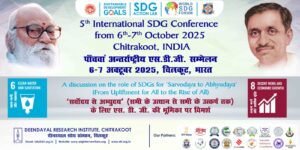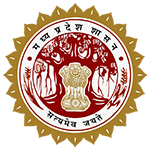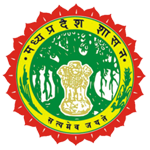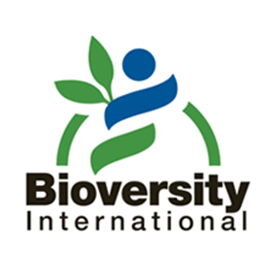
OUTCOME DOCUMENT
5th INTERNATIONAL SDG CONFERENCE,
6th – 7th OCTOBER 2025, CHITRAKOOT
The 5th International SDG Conference was held on 6th – 7th October, 2025 at Chitrakoot, in continuation of the underlying theme inspired by Pandit Deendayal Upadhyaya’s Ekatma Manav Darshan (Integral Humanism). The spirit of Ekatma Manav Darshan is ‘Gramodaya se Sarvodaya’ (From Rural Upliftment to Upliftment of All); and from ‘Sarvodaya to Abhyudaya’ (From upliftment for All to the Rise of All).
The Plenary Session reiterated the links between Pt. Deendayal Upadhyaya’s Integral Humanism and Bharat Ratna Rashtrarishi Nanaji Deshmukh’s rural empowerment interventions with the Sustainable Development Goals, especially with Goals 6 & 8, that were the themes of this Conference.
At the Calicut session of the Jan Sangh in 1967 Pt. Deendayal Upadhyaya had stated, “We shall make Mother India Sujala, Suphala (overflowing with water and laden with fruits) in the real sense of these words … with faith in ultimate victory, let us dedicate ourselves to this task.”
Nanaji’s rural development mantra – ‘Har haath kho denge kaam; har khet kho denge pani’ (Will give every hand work; and every field water) – is the essence of SDGs 6 and 8.
In the technical sessions, on SDG 6 “Ensure availability and sustainable management of water and sanitation for all”; and SDG 8 “Promote sustained, inclusive and sustainable economic growth, full and productive employment and decent work for all”, where bureaucrats, politicians, policy makers and members of civil society discussed the SDG targets, the presentations and conversations reflected a consensus on community initiatives, and concluded that people’s participation is critical for the success of the SDGs and progress towards the targets, if the interventions were to be sustainable and not a one-time limited technocratic exercise.
The gathering highlighted some of the issues and suggested pathways for progress in these two SDG:
- Public Participation and initiative is the key to Success. Involve the public; and make public-centric programmes the pillar of all campaigns, especially water harvesting and management.
- Jal, Jungle, Jamin, Jan and Janwar and Jankari (water, forest, land, people, animals and information) needs to be looked at holistically to ensure judicious and harmonious usage of all natural resources.
- Rivers are a source of life for the planet and there is a strong ecological integrity among different ecosystems – riparian zone, floodplain, embankment and upland that maintain the health of a river and are highly degraded. Eradicating invasive species and restoring the historical ecological niches is the possible solution. The best buffer could be the Biodiversity Parks as they are unique landscapes/ riverscapes and provide ecological integrity between the riverfront and the river.
- Reuse of recycled sewage water is a key component of Net Zero climate goals and sustainability; it needs to be further incentivised with ‘polluter pays’ principle. The Indore and Nagpur, as well as the DDA Neela Hauz Biodiversity Park in situ remediation models need to be replicated and upscaled.
- Children are the key to the future: educating them on preserving and conserving natural resources, especially water, can move the needle towards a more sustainable planet, as it has done in the Swachh Bharat Abhiyan (Clean India Campaign).
- A special strategy for O&M and Asset management of water sanitation assets for effective service delivery is required.
- Digital tools for information management at community level needs to be promoted for water sanitation and service delivery, integrating communication media.
- Economic Growth must incorporate dimensions of decent worksince that connects employers and employee organisations with the concerns and aspirations of the working classes, women, youth and persons with disability. Countries must share case studies and good practices.
- Technology today is both economical and easy to use –g., drones, sensors, barcodes, wearables – and has percolated across income and occupational categories. Emerging and potentially dominant technologies such as AI/ML must be included in education and re-skilling/ up-skilling programs for the workforce of today and tomorrow.
- The world of work has today grown beyond the conventional confines of office/ shop/ factory, and there is an opportunity bridge the pay and work gap between men and women, as the old barriers of mobility and double burden are disappearing thanks to work from home, remote work and other modern practices. It is important to enable women to get back into work after maternity by flexible HR policies. Promoting care economy – child care and early schooling services – will not only help in reintegration but also open up new job avenues for women as caregivers and educators.
- Informal/unorganised sector is not a weakness of the economy but a pillar of future growth – the contribution needs to be reflected better not only in official statistics but also in company boardroom reports and media.
- Vulnerable employment is a global challenge. Gig-work is a rapidly expanding sector but the precarious situation of gig-workers in terms of income levels and social safety nets needs to addressed. Employers can and must invest in re-skilling and up-skilling to ensure better prospects of decent work for workers in this sector.
The Conference affirmed the urgency of focused public action to achieve SDGs pertaining to water & sanitation and growth that is pro-jobs, pro-women and pro-nature.
The goals may be worded differently and have different targets and indicators, but they are all inter-related when it comes to action on the ground.
Deendayalji’s vision and Nanaji’s interventions form the bedrock of all attempts to achieve SDGs by 2030 and beyond!!

WITH THE SUPPORT OF THE
“Ministry of Rural Development
& Panchayati Raj,
Government of Madhya Pradesh”


Learn
Use the Platform to learn new Interventions for specific needs. Save you time and effort.

Implement
Follow the Process for easy implementation.

Teach
Teach others how to use the interventions you have learnt.

Why
The 2030 Agenda for Sustainable Development built on the principle of “leaving no one behind” emphasises a holistic approach towards achieving sustainable development for all. Several Government, Private Sector and Civil Society Organisations are working toward achieving the SDGs since 2015 and in some cases, before the SDGs were even defined. Despite the range and scale of efforts, most solutions and interventions remain local, because of a lack of a forum where Social Workers, NGOs, Governmental Organisations, and International Agencies, as well as the communities and beneficiaries of these model efforts are able to engage, to exchange validated interventions that have been developed by them, for easy access by other stakeholders.
How
There is a need to develop a forum where measurable, sustainable and replicable models for SDGs are represented. There, solutions can be developed for all stakeholders, including vulnerable as well as impacted communities, and the best practices developed as capsules for easy adaptation and implementation worldwide.
Deendayal Research Institute (DRI), founded by Bharat Ratna Rashtrarishi Nanaji Deshmukh in 1968 in New Delhi, India, believes that a forum where measurable, sustainable and replicable models for SDGs are represented, would fill a gap through this Global Platform of curated menu of proven interventions that help achieve SDGs 1-8. As SDGs 9-17 are more the work of State Governments and International Agencies, validated interventions for these SDGs will be added at a later stage.








